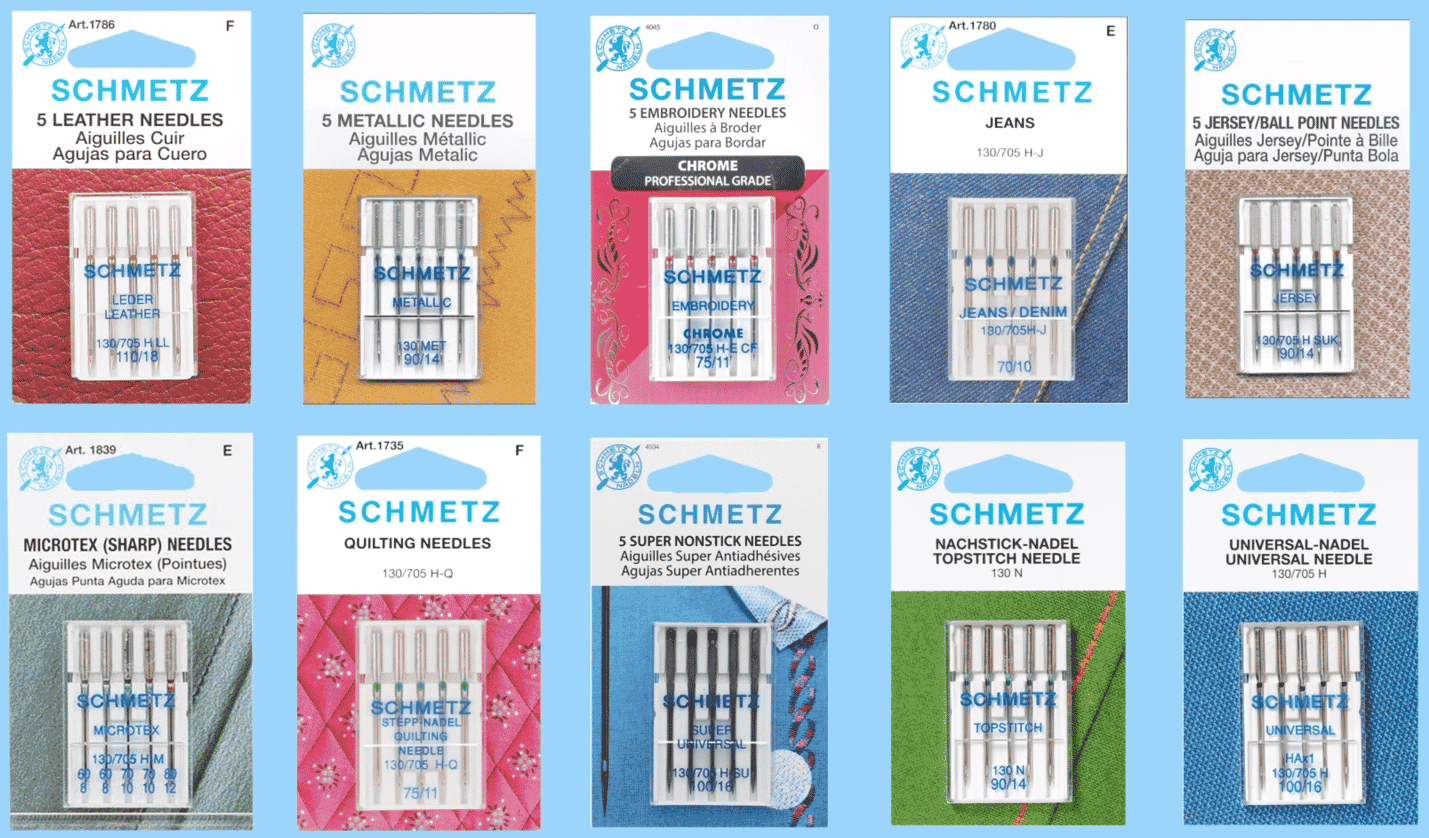
Due to the variety of fabrics and threads available on the market, needle manufacturers have quite a selection to choose from. Every needle has its own purpose, but how do you know which is the best one to use for your project? We’ll walk you through the different categories of needles, the anatomy of a needle, and when to choose a certain type of needle. We’ll be focusing on domestic sewing machine needles as these are the most widely used.
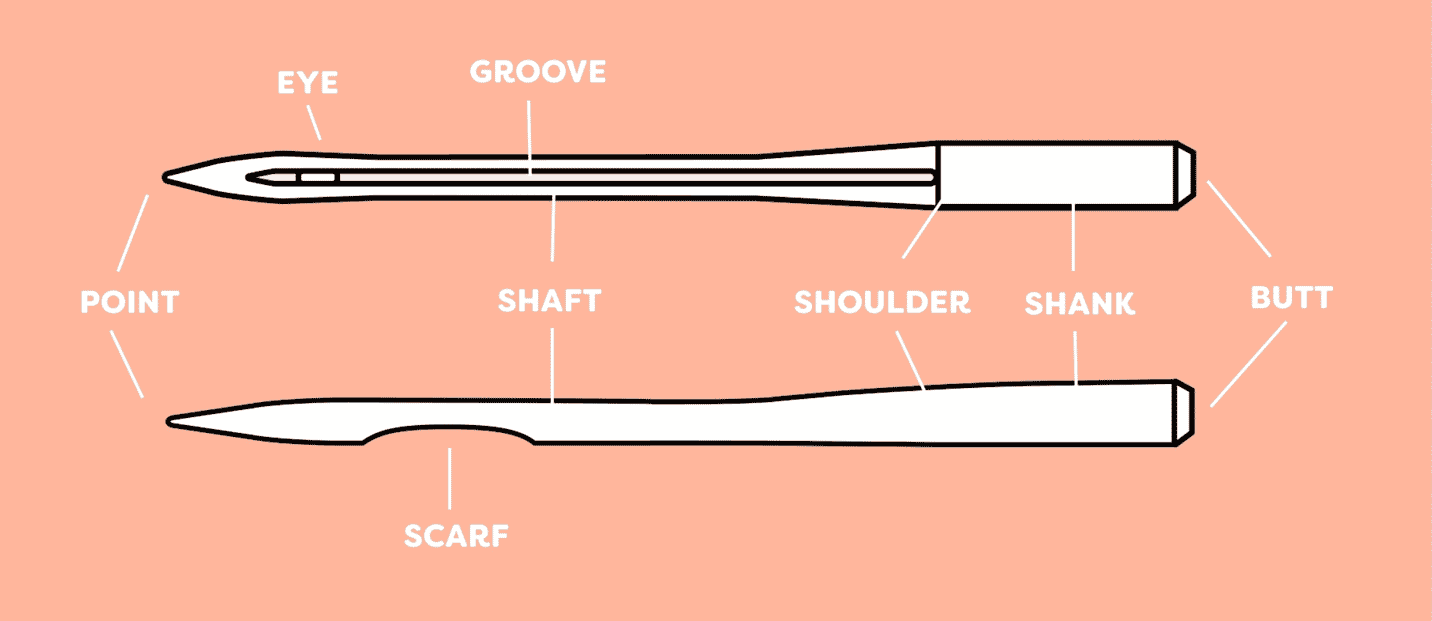
Part 1: The Anatomy of a Needle
Every needle is made up of roughly the same parts. On the front of the needle, you’ll see the point of the needle that pierces the fabric. Above that is the eye which the top thread runs through, and the groove which runs all along the shaft of the needle. This groove allows the thread to be nestled inside, protecting it as the needle runs through the material and keeping it out of the way so it can glide through the material without protruding, thus creating smooth and even stitches.
Above the shaft is the shank which is the part of the needle that is held by the machine. The shaft of most domestic sewing machine needles usually have a rounded front face and a flat back side to make it easy for insertion. At the top of the shaft is the butt which is the part that is inserted into the machine. The shoulder is the section between the shank and shaft. This is where most needle brands will add a strip of colour indicating the type of needle it is.
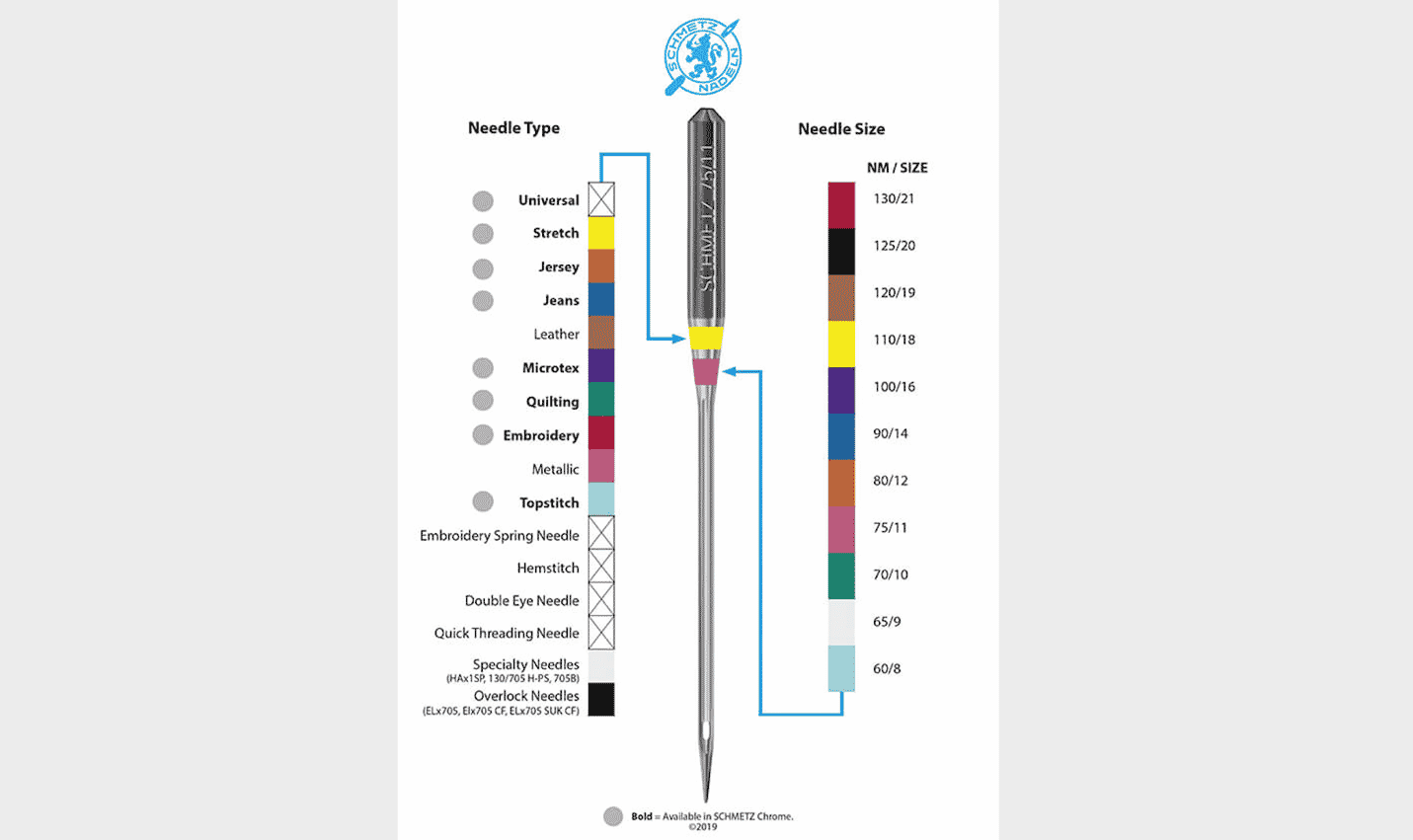
On the back side of the needle you will find the scarf, an indentation that makes it easier for the bobbin thread to grab the top thread and create a stitch. The length of the scarf will vary depending on the type of needle.
Part 2: Needle Sizing System
There are two ways to measure needle size, the American and European systems. Both are usually indicated on the packaging of the needle. American sizes usually range from 8 to 19, while European sizes range from 60 to 120. For example, the sizing on this Schmetz needle case indicates the European size on the left and the American size on the right. So a 90/14 needle means it’s a 90 in the European size and 14 in the American size. The larger the number, the larger the needle.
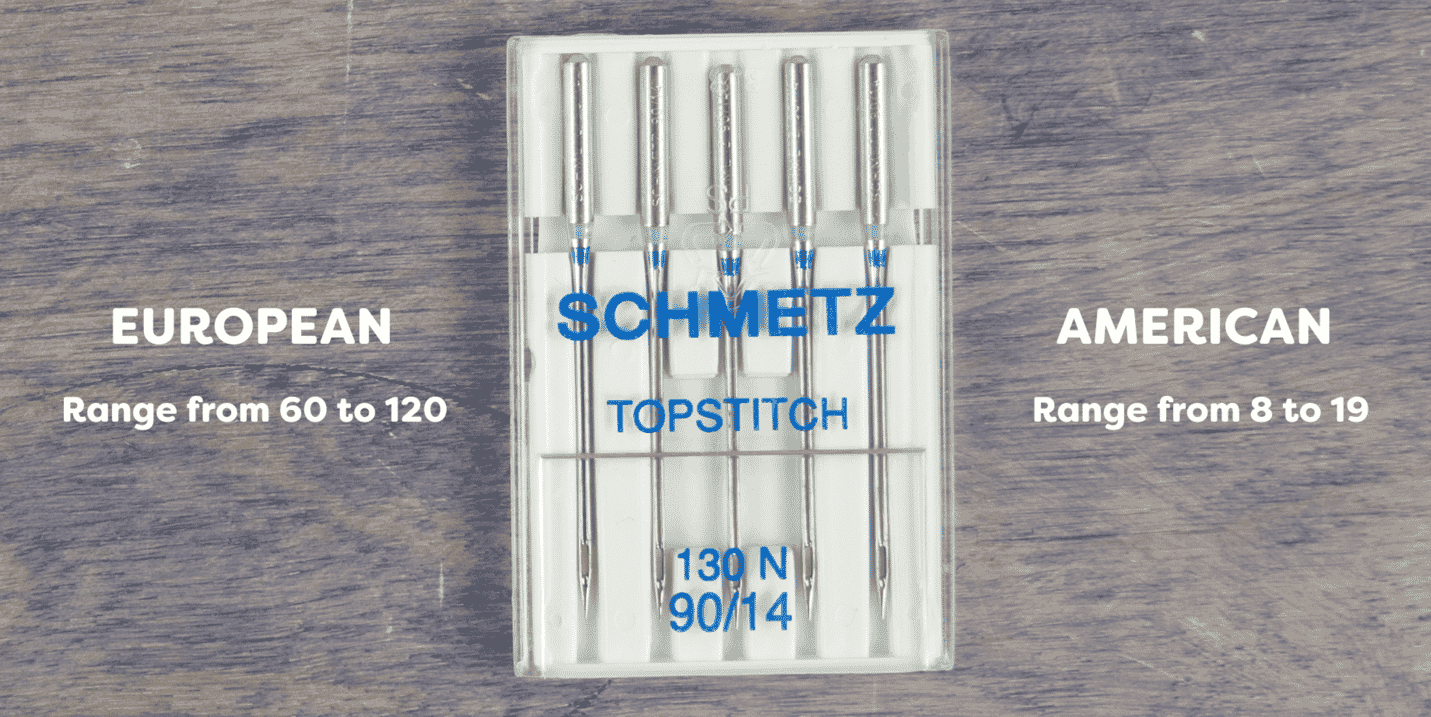
You will want to pair a smaller size needle with a finer thread and a larger needle with a larger thread. Using too large of a needle will cause the thread to sit in a hole too large for it, which can look ugly. And a needle that’s too small for the thread will cause excess friction from the thread pulling through too small of a hole in the fabric and won’t fit well in the eye of the needle, which will lead to thread breaks.
Part 3: Types of Needles
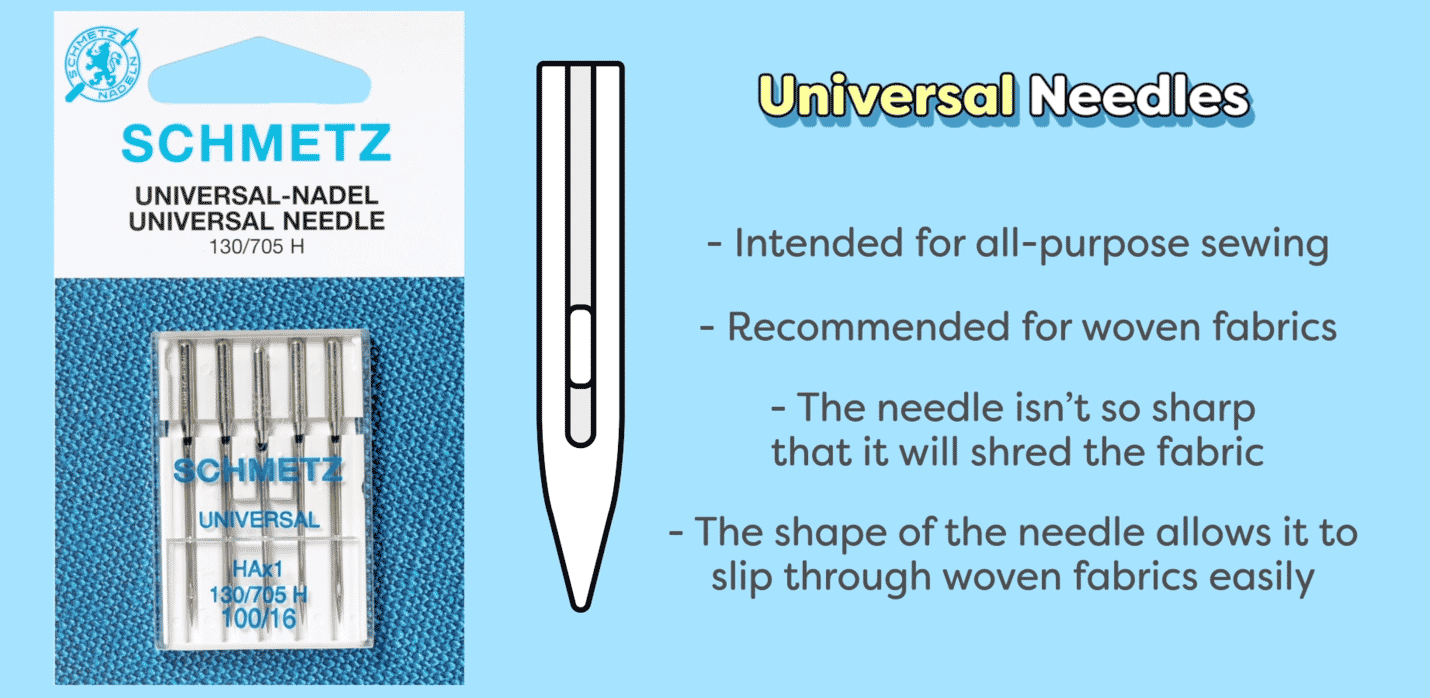
Universal Needles
Universal needles are intended for all-purpose sewing. It is recommended to use a universal needle for woven fabrics as it is designed with rounded edges and a tapered point, meaning the needle isn’t so sharp that it will shred the fabric. The shape of the needle allows it to slip through woven fabrics easily rather than cutting through it which can wreck the fabric.
Suggestions to Pair a Universal Needle With
| Size: | Threadline: |
| 80/12
120/19 |
Designer™ 40wt All-Purpose Polyester
GlaMore™ 12wt Rayon & Metallic |
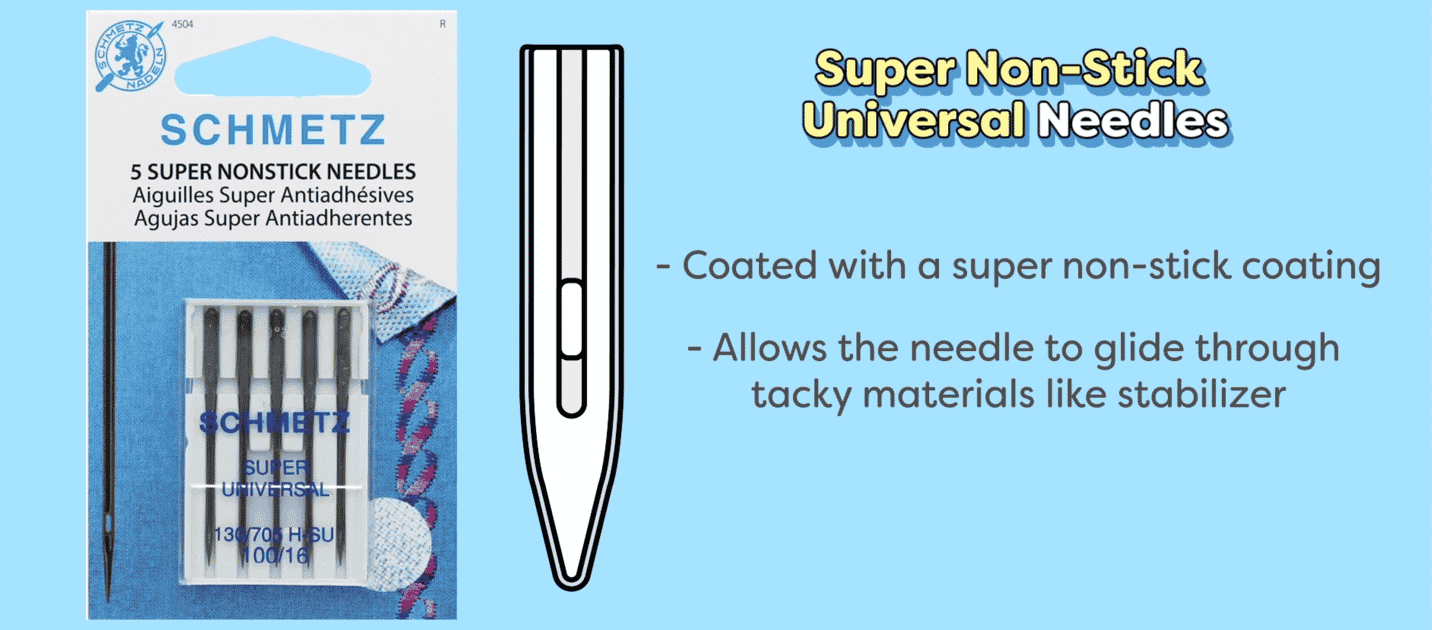
Super Non-Stick Universal Needles
A popular new needle on the market is a super non-stick needle. These universal needles are coated with a super non-stick coating like the kind you’d find on a Teflon pan. This coating allows the needle to glide through tacky materials like stabilizer, which makes a huge difference in improving the stitch quality and consistency and preventing thread breaks.
Suggestions to Pair a Super Non-Stick Universal Needle With
| Size: | Threadline: |
| 80/12
80/12 90/14 110/18 |
Ahrora™ 40wt Glow in the Dark Polyester
Flash™ 40wt Light-Reflective Polyester HomeDec™ 60wt, 40wt, & 30wt Multi-Filament Enhanced Polyester GlaMore™ 12wt Rayon & Metallic |
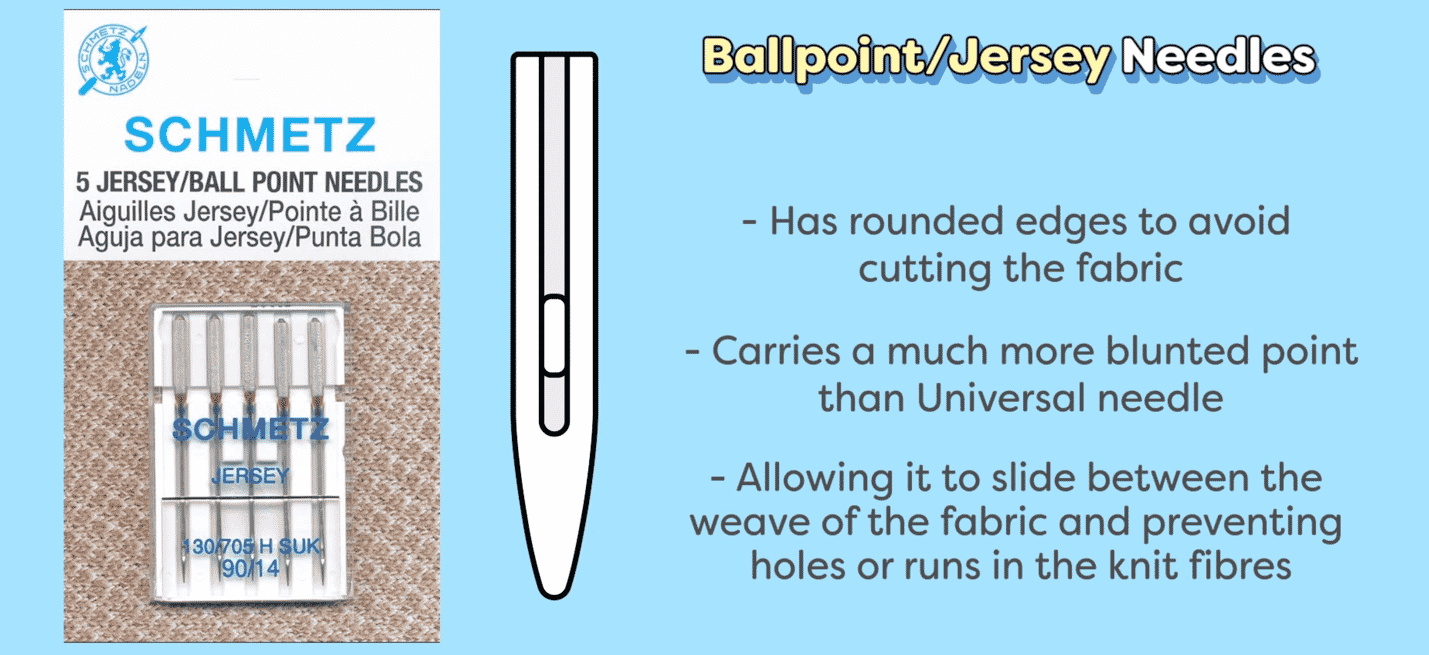
Ballpoint/Jersey Needles
Similar to universal needles, a ballpoint or jersey needle has rounded edges to avoid cutting the fabric. However, it differs in that it carries a much more blunted point in comparison to the universal, allowing it to slide between the weave of the fabric and preventing holes or runs in the knit fibres. It is best used for close knit fabrics such as jersey or interlock fabrics.
Suggestions to Pair a Ballpoint/Jersey Needle With
| Size: | Threadline: |
| 80/12 | Designer™ 40wt All-Purpose Polyester |
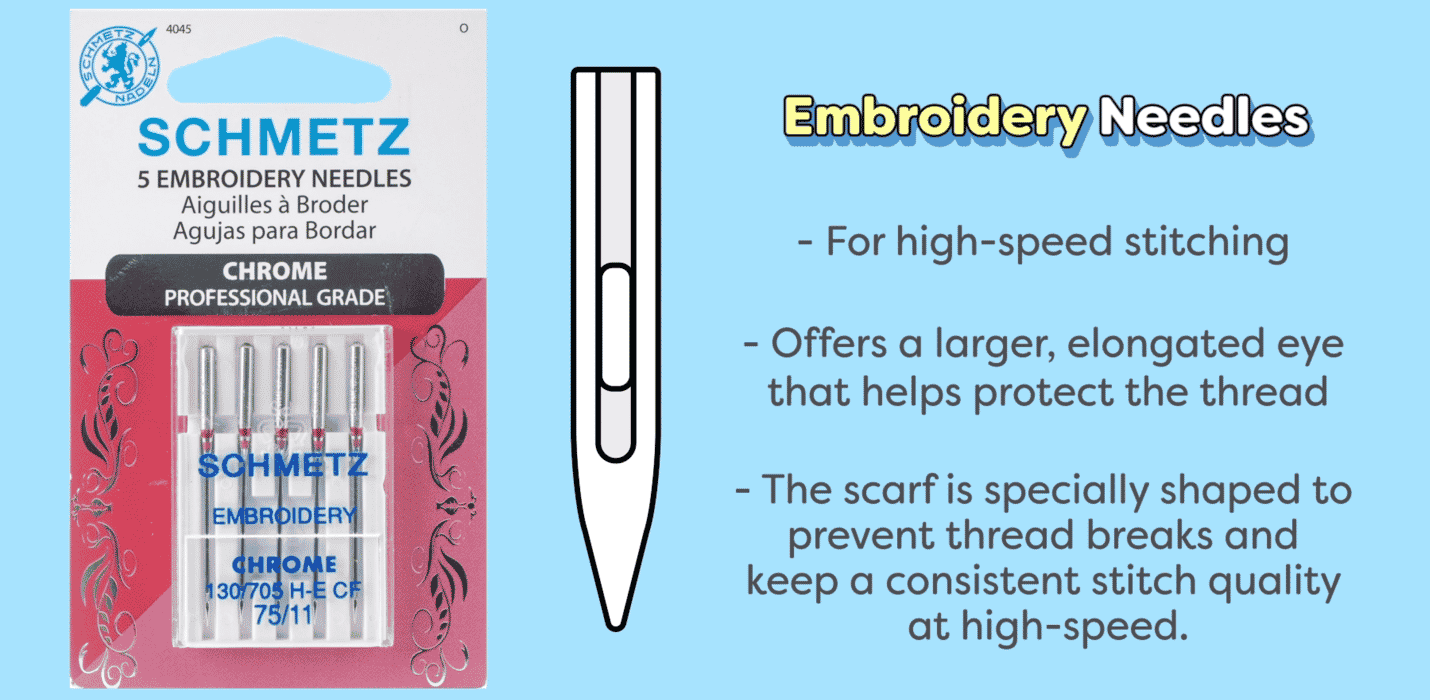
Embroidery Needles
Because machine embroidery involves a lot of high-speed stitching in a dense area, embroidery needles offer a larger, elongated eye that helps protect the thread, preventing it from breaking. The scarf is also specially shaped to prevent thread breaks and keep a consistent stitch quality at high-speed.
Suggestions to Pair an Embroidery Needle With
| Size: | Threadline: |
| 75/11
75/11 |
Polyfast™ 40wt Polyester
Splendor™ 40wt Rayon |
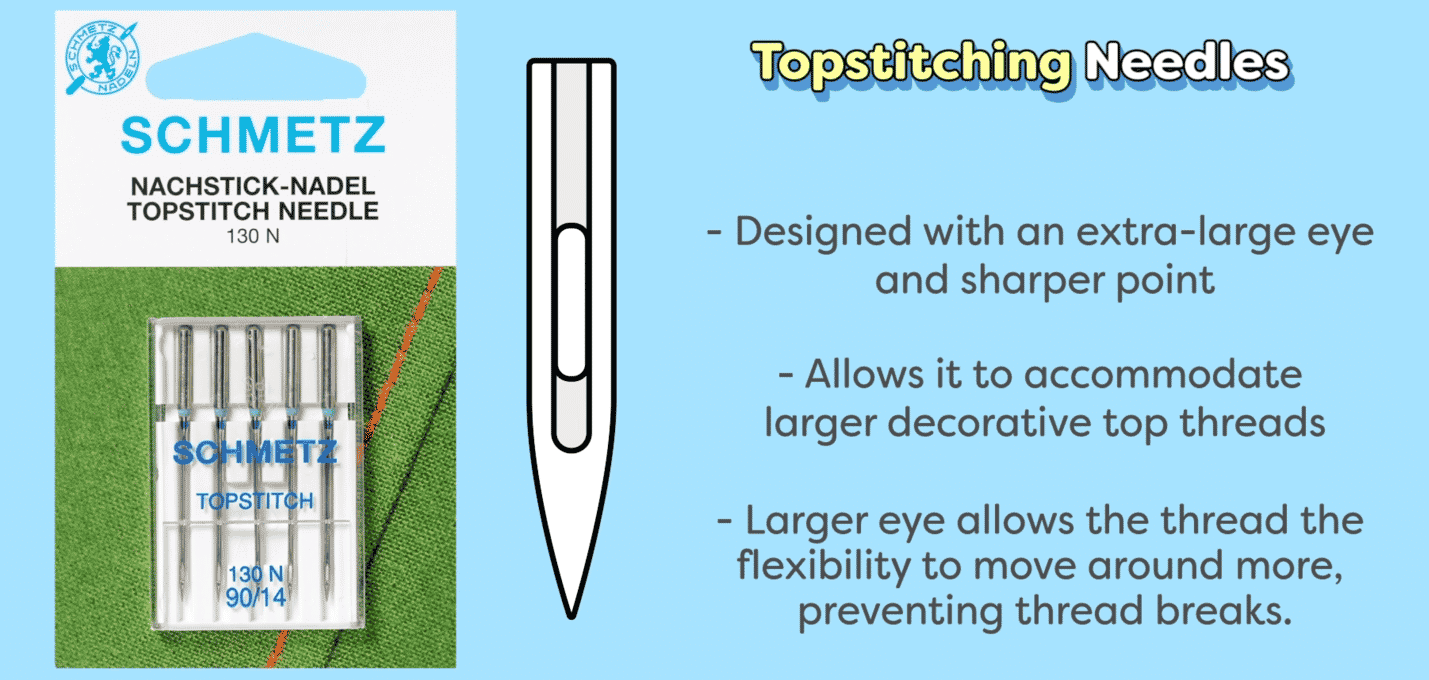
Topstitching Needles
Topstitching needles are designed with an extra-large eye and sharper point, allowing it to accommodate larger decorative top threads. Other specialty threads that are usually considered less strong, such as metallic threads, should also be used with this needle as the larger eye allows the thread the flexibility to move around more, preventing thread breaks.
Suggestions to Pair a Topstitching Needle With
| Size: | Threadline: |
| 80/12
80/12 80/12 80/12 90/14 90/14 90/14 90/14 90/14 90/14 90/14 90/14 90/14 90/14 or 100/16 90/14 or 100/16 90/14 or 100/16 |
Ahrora™ 40wt Glow in the Dark Polyester
DecoBob™ 80wt Cottonized Polyester Efina™ 60wt Extra Long Staple Egyptian Cotton Konfetti™ & Tutti™ 50wt Long Staple Egyptian Cotton Ellana™ 12wt 50/50 Wool/Acrylic FabuLux™ 40wt Trilobal Polyester Flash™ 40wt Light-Reflective Polyester Hologram™ Slitted Polyester Master Quilter™ 40wt Cottonized Polyester Mirage™ 30wt Random Dyed Rayon Silco™ 35wt Lint-Free Cotton Spotlite™ 40wt Rayon Core Metallic Ultima™ 40wt Cotton Wrapped Polyester Accent™ 12wt Rayon D-Twist 20wt Twisted Rayon Spagetti™ & Fruitti™ 12wt Long Staple Egyptian Cotton |
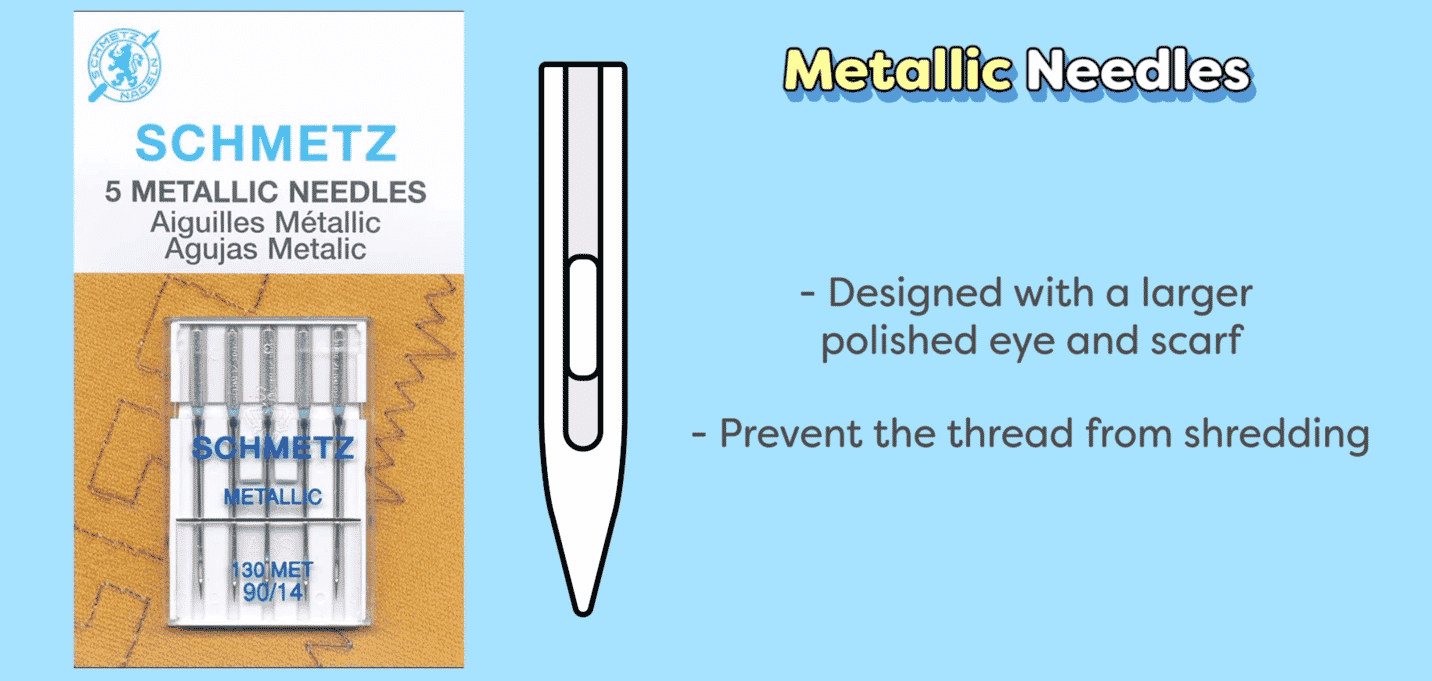
Metallic Needles
These needles are similar to an embroidery needle in that they are designed with a larger polished eye and scarf to prevent the thread from shredding. These needles are intended for metallic threads.
Suggestions to Pair a Metallic Needle With
| Size: | Threadline: |
| 80/12 or 90/14
90/14 |
Hologram™ Slitted Polyester
Spotlite™ Rayon Core Metallic |
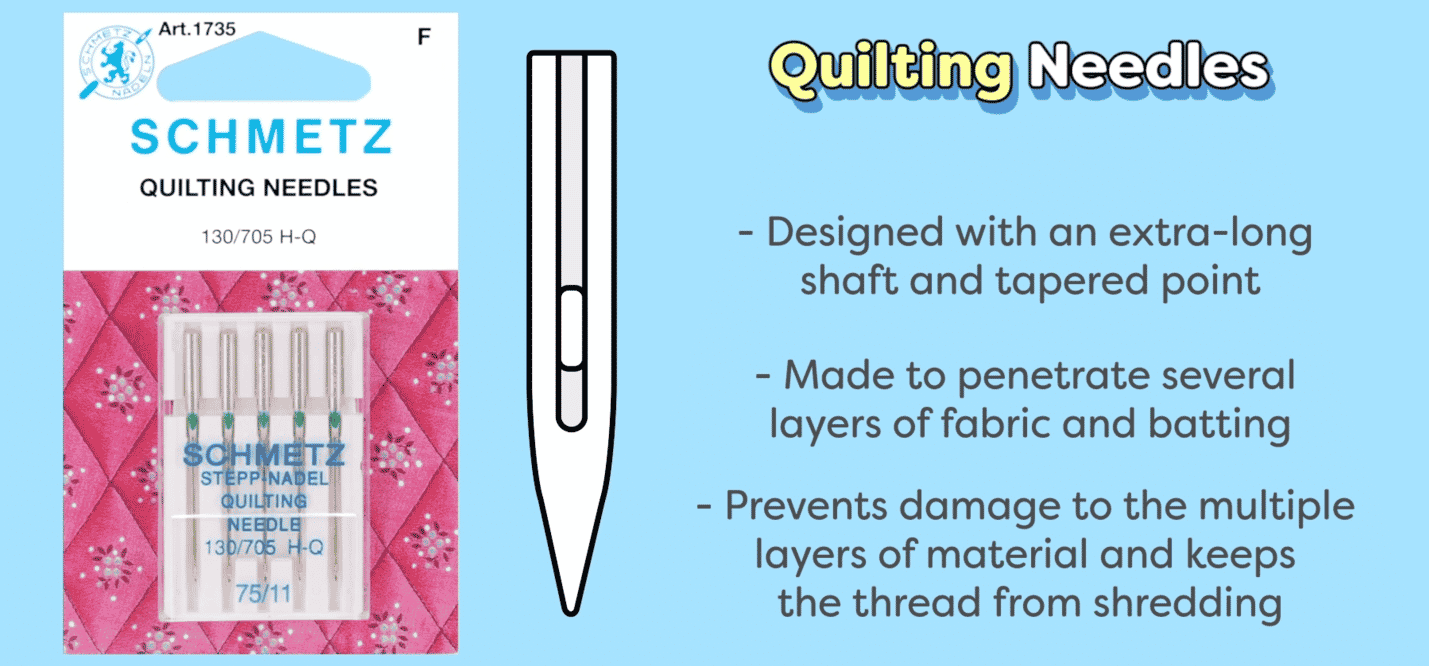
Quilting Needles
Quilting needles are designed with an extra-long shaft and tapered point made to penetrate several layers of fabric and batting. Its slightly rounded point prevents damage to the multiple layers of material and keeps the thread from shredding.
Suggestions to Pair a Quilting Needle With
| Size: | Threadline: |
| 75/11 or 90/14
75/11 or 90/14 90/14 90/14 90/14 90/14 90/14 90/14 |
DecoBob™ 80wt Cottonized Polyester
InvisaFil™ 100wt Cottonized Polyester Ahrora™ 40wt Glow in the Dark Polyester FabuLux™ 40wt Trilobal Polyester Konfetti™ & Tutti™ 50wt Long Staple Egyptian Cotton Master Quilter™ 40wt Cottonized Polyester Silco™ 35wt Lint-Free Cotton Ultima™ 40wt Cotton Wrapped Polyester |
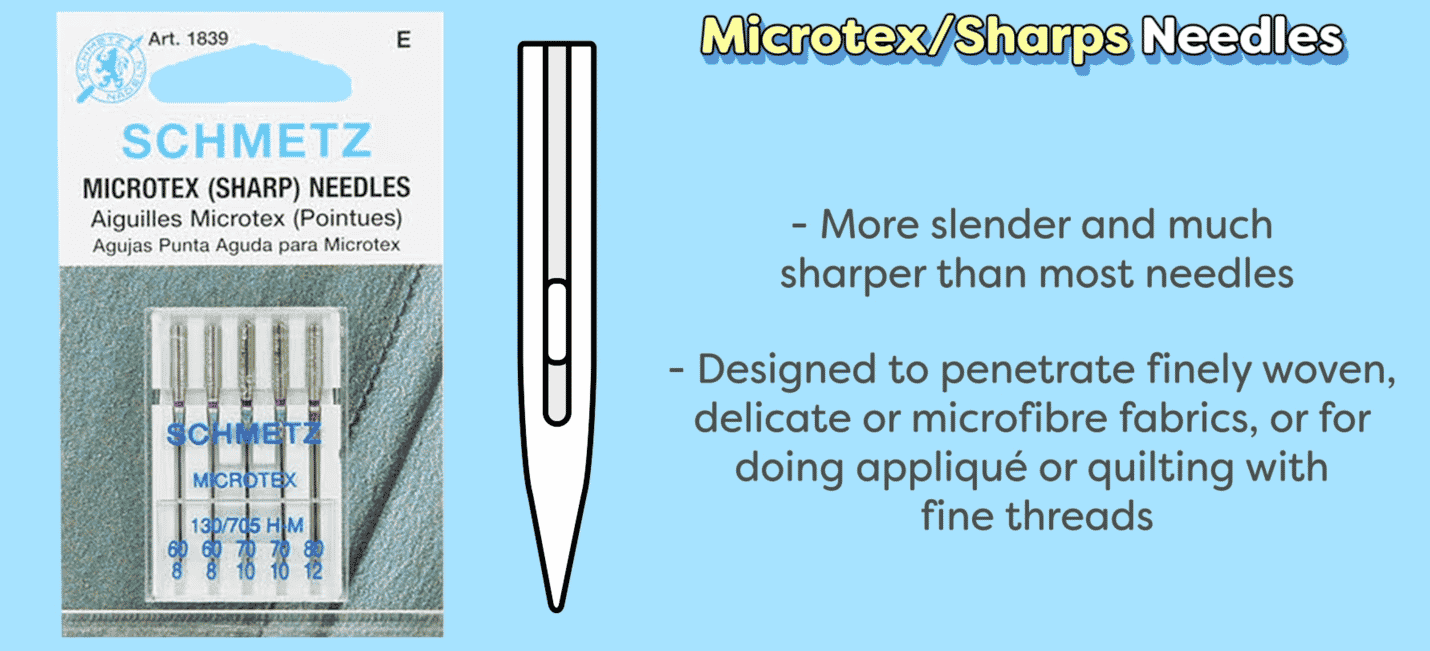
Microtex/Sharps Needles
These needles are more slender and much sharper than most needles. They are designed to penetrate finely woven, delicate or microfibre fabrics, or for doing appliqué or quilting with fine threads.
Suggestions to Pair a Microtex/Sharps Needle With
| Size: | Threadline: |
| 60/8 or 70/10 or 80/12
70/10 or 80/12 |
InvisaFil™ 100wt Cottonized Polyester
DecoBob™ 80wt Cottonized Polyester |
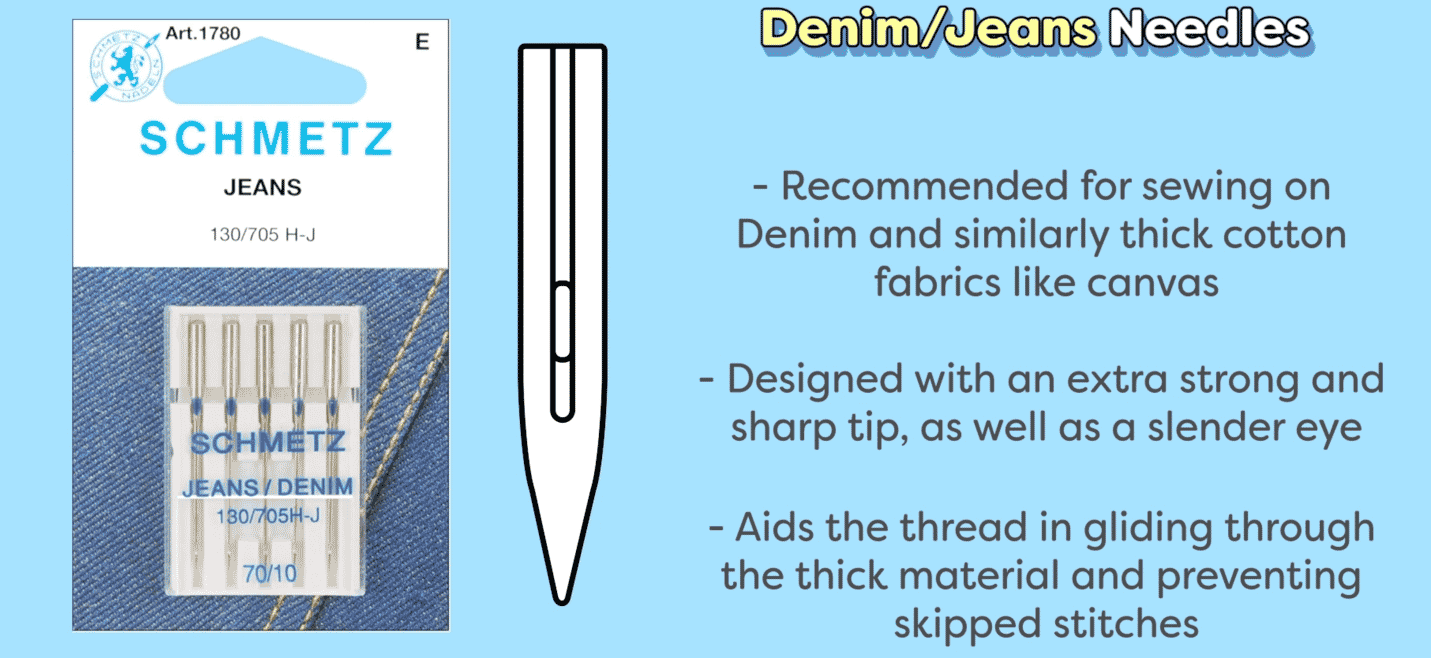
Denim/Jeans Needles
Denim and similarly thick cotton fabrics like canvas may cause problems with other needles due to the heavy material the needle must sew through. This needle is designed with an extra strong and sharp tip, as well as a slender eye that aids the thread in gliding through the thick material and preventing skipped stitches.
Suggestions to Pair a Denim/Jeans Needle With
| Size: | Threadline: |
| 90/14
100/16 |
Designer™ 40wt All-Purpose Polyester
Spagetti™ & Fruitti™ 12wt Long Staple Egyptian Cotton |
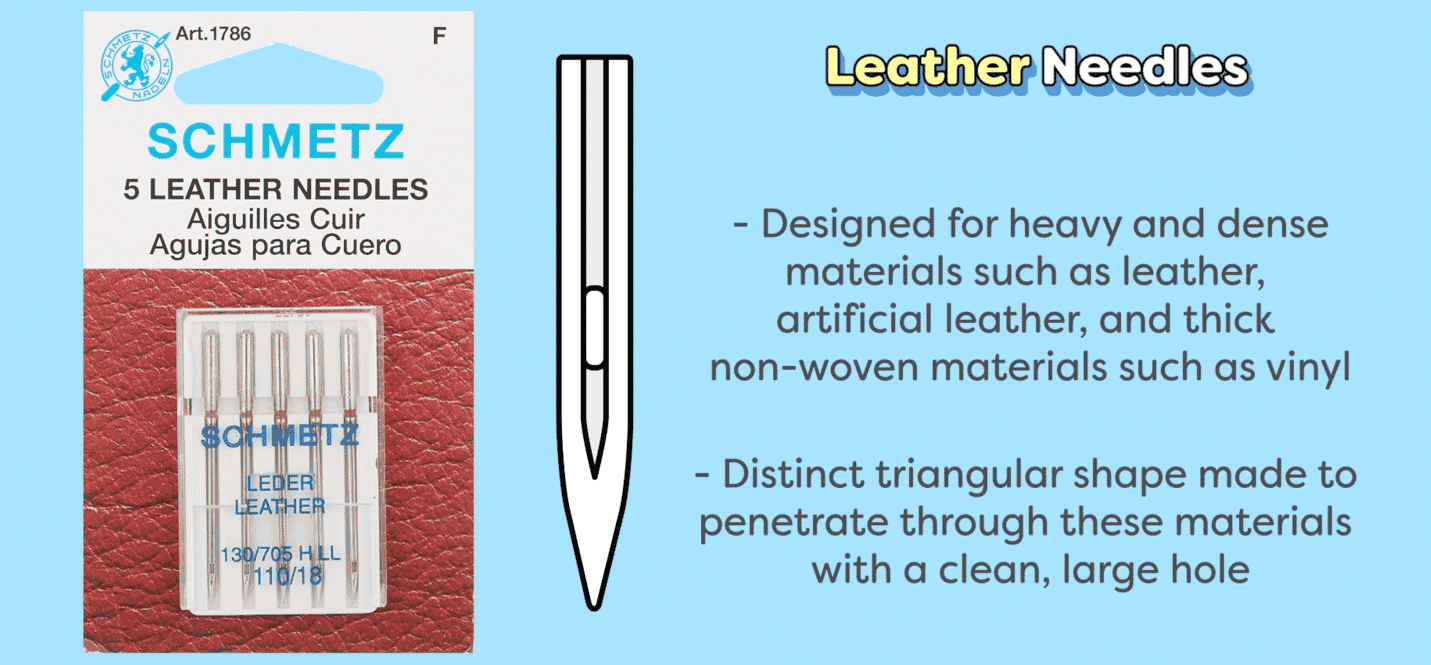
Leather Needles
Designed for heavy and dense materials such as leather, artificial leather, and thick non-woven materials such as vinyl. Leather needles have a distinct triangular shape made to penetrate through these materials with a clean, large hole.
Suggestions to Pair a Leather Needle With
| Size: | Threadline: |
| 90/14 | HomeDec™ 60wt, 40wt, & 30wt Multi-Filament Enhanced Polyester |
These are just some of the most common domestic sewing machine needles on the market. Let us know in the comments if you learned something new from this video or tell us about a sewing needle you can’t live without.

